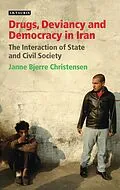In the aftermath of the Iranian Revolution, the government of the Islamic Republic initiated a stringent anti-drug campaign that included fining addicts, imprisonment, physical punishment and even the death penalty. Despite these measures, drug use was, and is still, commonplace. Based on her most recent fieldwork, Janne Bjerre Christensen explores the mounting problems of drug use in Iran, how treatment became legalized in 1998, how local NGOs offer methadone treatment in Tehran and face continuous political challenges in doing so, and how drug use is critically discussed in Iranian media and cinema. Drugs, Deviancy and Democracy in Iran is thus a unique account of Iran's recent social and political history, drawing important conclusions about the complexity of state power, and the growing impact of civil society, vital for all those interested in Iran's history, politics and society.
Autorentext
Janne Bjerre Christensen holds a PhD in International Development Studies from Roskilde University, Denmark. Educated in anthropology at the School of Oriental and African Studies (SOAS), University of London and the University of Copenhagen, where she also taught.
Inhalt
Introduction: Drugs, NGOs and the Iranian State
Chapter 1: (Dis)locating the State: Order and Power
Chapter 2: The Iranian State and the Reform Movement: Debating Governance
Chapter 3: Countering the Discourse of Dialogue: NGOs and the State of Ahmadinezhad
Chapter 4: Changing Drug Policies: Institutionalizing a New Social Order
Chapter 5: Negotiating Normalcy: NGOs Treating Drug Users
Chapter 6: Shooting Drugs: Re-imagining the 'Moral Public'
Conclusion: What is 'Reform'?
